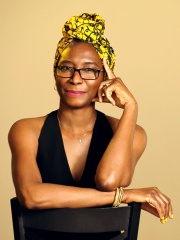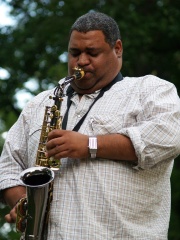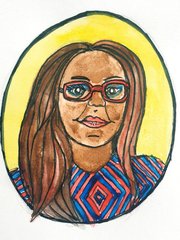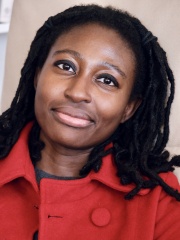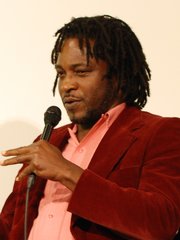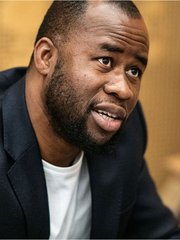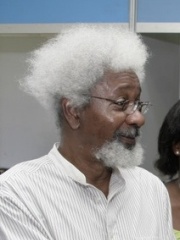
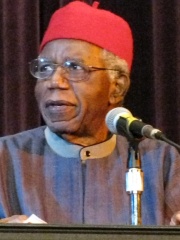
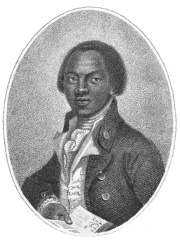
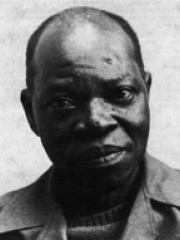
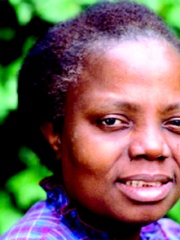
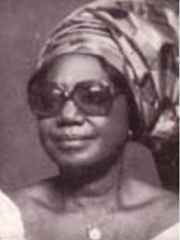
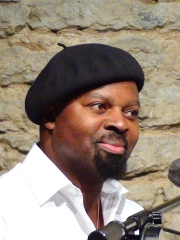
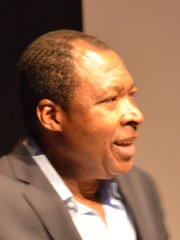
The Most Famous
WRITERS from Nigeria
This page contains a list of the greatest Nigerian Writers. The pantheon dataset contains 7,302 Writers, 19 of which were born in Nigeria. This makes Nigeria the birth place of the 55th most number of Writers behind Uruguay, and Bosnia and Herzegovina.
Top 10
The following people are considered by Pantheon to be the top 10 most legendary Nigerian Writers of all time. This list of famous Nigerian Writers is sorted by HPI (Historical Popularity Index), a metric that aggregates information on a biography's online popularity. Visit the rankings page to view the entire list of Nigerian Writers.

1. Wole Soyinka (b. 1934)
With an HPI of 69.29, Wole Soyinka is the most famous Nigerian Writer. His biography has been translated into 96 different languages on wikipedia.
Akinwande Oluwole Babatunde Soyinka (born 13 July 1934) is a Nigerian author, best known as a playwright and poet. He has written three novels, ten collections of short stories, seven poetry collections, twenty-five plays and five memoirs. He also wrote two translated works and many articles and short stories for many newspapers and periodicals. He is widely regarded as one of Africa's greatest writers and one of the world's most important dramatists. He was awarded the 1986 Nobel Prize in Literature for his "wide cultural perspective and poetic overtones fashioning the drama of existence". Born into an Anglican Yoruba family in Aké, Abeokuta, Soyinka had a preparatory education at Government College, Ibadan and proceeded to the University College Ibadan. During his education, he co-founded the Pyrate Confraternity. Soyinka left Nigeria for England to study at the University of Leeds. During that period, he was the editor of the university's magazine, The Eagle, before becoming a full-time author in the 1950s. In the UK, he started writing short stories and making records for the BBC Lecture series. He wrote many plays which were performed on radios and in theatres in Nigeria and the UK, especially the Royal Court Theatre. He has been married to his third wife Folake Doherty since 1989. Since 1 September 2022, Soyinka has held the position of Arts Professor of Theatre at New York University Abu Dhabi. Many of Soyinka's novels and plays are set in Nigeria, reflecting the country’s history, culture, and political struggles. Alongside these works, he produced a wide range of satirical writings that reached a broad audience and enjoyed considerable popularity. He is also an accomplished poet, with numerous individual poems and several published collections to his name. He achieved successes with his plays including The Swamp Dwellers (1958), The Lion and the Jewel (1958), and The Invention, which was one of his early plays to be produced at the Royal Court Theatre. Soyinka wrote a number of other works, including The Interpreters (1965), Season of Anomy (1973), Chronicles from the Land of the Happiest People on Earth, and Harmattan Haze on an African Spring. In July 2024, Bola Tinubu renamed the National Arts Theatre after Soyinka during his 90th birthday.

2. Chinua Achebe (1930 - 2013)
With an HPI of 67.37, Chinua Achebe is the 2nd most famous Nigerian Writer. His biography has been translated into 88 different languages.
Chinua Achebe ( ; born Albert Chinụalụmọgụ Achebe; 16 November 1930 – 21 March 2013) was a Nigerian novelist, poet, and critic who is regarded as a central figure of modern African literature. His first novel and magnum opus, Things Fall Apart (1958), occupies a pivotal place in African literature and remains the most widely studied, translated, and read African novel. Along with Things Fall Apart, his No Longer at Ease (1960) and Arrow of God (1964) complete the "African Trilogy". Later novels include A Man of the People (1966) and Anthills of the Savannah (1987). Achebe is often referred to as the "father of modern African literature", although he vigorously rejected the characterization. Born in Ogidi, Colonial Nigeria, Achebe's childhood was influenced by both Igbo traditional culture and colonial Christianity. He excelled in school and attended what is now the University of Ibadan, where he became fiercely critical of how Western literature depicted Africa. Moving to Lagos after graduation, he worked for the Nigerian Broadcasting Service (NBS) and garnered international attention for his 1958 novel Things Fall Apart. In less than 10 years, he would publish four further novels through the publisher Heinemann, with whom he began the Heinemann African Writers Series and galvanized the careers of African writers, such as Ngũgĩ wa Thiong'o and Flora Nwapa. Achebe sought to escape the colonial perspective that framed African literature at the time, and drew from the traditions of the Igbo people, Christian influences, and the clash of Western and African values to create a uniquely African voice. He wrote in and defended the use of English, describing it as a means to reach a broad audience, particularly readers of colonial nations. In 1975 he gave a controversial lecture, "An Image of Africa: Racism in Conrad's Heart of Darkness", which was a landmark in postcolonial discourse. Published in The Massachusetts Review, it featured criticism of Albert Schweitzer and Joseph Conrad, whom Achebe described as "a thoroughgoing racist". When the region of Biafra broke away from Nigeria in 1967, Achebe supported Biafran independence and acted as ambassador for the people of the movement. The subsequent Nigerian Civil War ravaged the populace, and he appealed to the people of Europe and the Americas for aid. When the Nigerian government retook the region in 1970, he involved himself in political parties but soon became disillusioned by his frustration over the continuous corruption and elitism he witnessed. He lived in the United States for several years in the 1970s, and returned to the US in 1990 after a car crash left him partially paralyzed. He stayed in the US in a nineteen-year tenure at Bard College as a professor of Languages and Literature. After winning the 2007 Man Booker International Prize, from 2009 until his death, he was professor of African studies at Brown University. Achebe's work has been extensively analyzed and a vast body of scholarly work discussing it has arisen. In addition to his seminal novels, Achebe's oeuvre includes numerous short stories, poetry, essays and children's books. A titled Igbo chief himself, his style relies heavily on the Igbo oral tradition, and combines straightforward narration with representations of folk stories, proverbs, and oratory. Among the many themes his works cover are culture and colonialism, masculinity and femininity, politics, and history. His legacy is celebrated annually at the Chinua Achebe Literary Festival.

3. Olaudah Equiano (1745 - 1797)
With an HPI of 59.98, Olaudah Equiano is the 3rd most famous Nigerian Writer. His biography has been translated into 36 different languages.
Olaudah Equiano (; c. 1745 – 31 March 1797), known for most of his life as Gustavus Vassa (), was a writer and abolitionist. According to his memoir, he was from the village of Essaka, in present-day southern Nigeria. Enslaved as a child in West Africa, he was shipped to the Caribbean and sold to a Royal Navy officer. He was sold twice more before purchasing his freedom in 1766. As a freedman in London Equiano supported the British abolitionist movement, in the 1780s becoming one of its leading figures. Equiano was part of the abolitionist group the Sons of Africa, whose members were Africans living in Britain. His 1789 autobiography, The Interesting Narrative of the Life of Olaudah Equiano, sold so well that nine editions were published during his life and helped secure passage of the British Slave Trade Act 1807, which abolished the slave trade in Britain. The Interesting Narrative gained renewed popularity among scholars in the late 20th century and remains a useful primary source.

4. Amos Tutuola (1920 - 1997)
With an HPI of 59.88, Amos Tutuola is the 4th most famous Nigerian Writer. His biography has been translated into 27 different languages.
Amos Tutuola (Yoruba: Ámósì Tutùọlá; 20 June 1920 – 8 June 1997) was a Nigerian writer who wrote books based in part on Yoruba folk-tales.

5. Chimamanda Ngozi Adichie (b. 1977)
With an HPI of 59.02, Chimamanda Ngozi Adichie is the 5th most famous Nigerian Writer. Her biography has been translated into 73 different languages.
Chimamanda Ngozi Adichie (; born 15 September 1977) is a Nigerian writer. Her works include fiction, nonfiction, and lectures. She is widely recognised as a central figure in postcolonial feminist literature. Born into an Igbo family in Enugu, Nigeria, Adichie was educated at the University of Nigeria in Nsukka, where she studied medicine for a year and half. She left Nigeria at the age of 19 to study in the United States at Drexel University in Philadelphia, Pennsylvania, and went on to study at a further three universities in the U.S.: Eastern Connecticut State University, Johns Hopkins University, and Yale University. Many of Adichie's novels are set in Nsukka, where she grew up. She started writing during her university education. She first wrote Decisions (1997), a poetry collection, followed by a play, For Love of Biafra (1998). She achieved early success with her debut novel, Purple Hibiscus. Adichie has written many works and has cited Chinua Achebe and Buchi Emecheta as inspirations. Her writing style juxtaposes Western and African influences, with particular influence from Igbo culture. Most of her works explore the themes of religion, immigration, gender and culture. Adichie is a public speaker who has spoken at many commencement ceremonies, including at Williams College (2017), Harvard University (2018), and the American University (2019). She has also delivered Ted Talks, among them, "The Danger of a Single Story" (2009) and "We Should All Be Feminists" (2012). Part of the latter was featured by American singer Beyoncé in her song, as well as being featured on a T-shirt by Dior in 2016. Adichie's awards and honours include academic and literary prizes, fellowships, grants, honorary degrees, and other high recognition, such as a MacArthur Fellowship in 2008 and induction into the American Academy of Arts and Sciences in 2017.

6. Buchi Emecheta (1944 - 2017)
With an HPI of 55.11, Buchi Emecheta is the 6th most famous Nigerian Writer. Her biography has been translated into 34 different languages.
Buchi Emecheta (born Florence Onyebuchi Emecheta; 21 July 1944 – 25 January 2017) was a Nigerian writer who was the author of novels, plays, autobiography, and children's books. She first received notable critical attention for her 1974 novel, Second Class Citizen. Her other books include The Bride Price (1976), The Slave Girl (1977) and The Joys of Motherhood (1979). Emecheta has been characterized as "the first successful black woman novelist living in Britain after 1948". Born in Lagos, Nigeria, Emecheta drew in her writing on themes of child slavery, motherhood, female independence and freedom through education, gaining recognition from critics and honours especially with her debut novel, Second Class Citizen. Her works often explore the themes of culture, and tensions between tradition and modernity. Most of her early novels were published by Allison and Busby, and her editor was Margaret Busby.

7. Flora Nwapa (1931 - 1993)
With an HPI of 53.13, Flora Nwapa is the 7th most famous Nigerian Writer. Her biography has been translated into 24 different languages.
Chief Florence Nwanzuruahu Nkiru Nwapa (13 January 1931 – 16 October 1993), was a Nigerian author who has been called the mother of modern African Literature. She was the forerunner to a generation of African women writers, and the first African woman novelist to be published in the English language in Britain. She achieved international recognition with her first novel Efuru, published in 1966 by Heinemann Educational Books. While never considering herself a feminist, she was best known for recreating life and traditions from an Igbo woman's viewpoint. She was herself a chief of the tribe, holding the otherwise exclusively male title Ogbuefi amongst them. She published African literature and promoted women in African society. She was one of the first African women publishers when she founded Tana Press in Nigeria in 1970. Nwapa engaged in governmental work in reconstruction after the Biafran War; in particular, she worked with orphans and refugees who were displaced during the war.

8. Ben Okri (b. 1959)
With an HPI of 52.23, Ben Okri is the 8th most famous Nigerian Writer. His biography has been translated into 41 different languages.
Sir Ben Golden Emuobowho Okri (born 15 March 1959) is a Nigerian-born British poet and novelist. Considered one of the foremost African authors in the postmodern and post-colonial traditions, Okri has been compared to authors such as Salman Rushdie and Gabriel García Márquez. In 1991, his novel The Famished Road won the Booker Prize. Okri was knighted at the 2023 Birthday Honours for services to literature.

9. Okwui Enwezor (1963 - 2019)
With an HPI of 47.19, Okwui Enwezor is the 9th most famous Nigerian Writer. His biography has been translated into 17 different languages.
Okwui Enwezor (23 October 1963 – 15 March 2019) was a Nigerian curator, art critic, writer, poet, and educator, specializing in art history. Enwezor served as artistic director of several major exhibitions, including Documenta11 (2002) and the 2015 Venice Biennale, becoming the first non-European and African-born curator to lead both. He was director of Munich’s Haus der Kunst from 2011 to 2018. Enwezor was also the founding editor of Nka: Journal of Contemporary African Art and held numerous academic appointments. In 2014, he was ranked 24 in the ArtReview list of the 100 most powerful people of the art world. He lived in New York City and Munich. Enwezor died in 2019 after a prolonged battle with cancer.
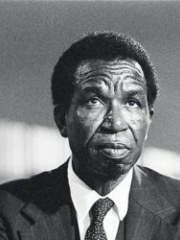
10. Cyprian Ekwensi (1921 - 2007)
With an HPI of 46.78, Cyprian Ekwensi is the 10th most famous Nigerian Writer. His biography has been translated into 20 different languages.
Chief Cyprian Odiatu Duaka Ekwensi (26 September 1921 – 4 November 2007) was a Nigerian author of novels, short stories, and children's books.
People
Pantheon has 19 people classified as Nigerian writers born between 1745 and 1988. Of these 19, 10 (52.63%) of them are still alive today. The most famous living Nigerian writers include Wole Soyinka, Chimamanda Ngozi Adichie, and Ben Okri. The most famous deceased Nigerian writers include Chinua Achebe, Olaudah Equiano, and Amos Tutuola. As of April 2024, 6 new Nigerian writers have been added to Pantheon including Amina Lawal, Bibi Bakare-Yusuf, and Biyi Bandele.
Living Nigerian Writers
Go to all RankingsWole Soyinka
1934 - Present
HPI: 69.29
Chimamanda Ngozi Adichie
1977 - Present
HPI: 59.02
Ben Okri
1959 - Present
HPI: 52.23
Amina Lawal
1973 - Present
HPI: 46.03
Sefi Atta
1964 - Present
HPI: 43.90
Chris Abani
1966 - Present
HPI: 43.35
Bibi Bakare-Yusuf
HPI: 41.38
Ayobami Adebayo
1988 - Present
HPI: 31.81
Funke Bucknor-Obruthe
1976 - Present
HPI: 31.30
Helen Oyeyemi
1984 - Present
HPI: 30.58
Deceased Nigerian Writers
Go to all RankingsChinua Achebe
1930 - 2013
HPI: 67.37
Olaudah Equiano
1745 - 1797
HPI: 59.98
Amos Tutuola
1920 - 1997
HPI: 59.88
Buchi Emecheta
1944 - 2017
HPI: 55.11
Flora Nwapa
1931 - 1993
HPI: 53.13
Okwui Enwezor
1963 - 2019
HPI: 47.19
Cyprian Ekwensi
1921 - 2007
HPI: 46.78
Biyi Bandele
1967 - 2022
HPI: 37.42
Chigozie Obioma
HPI: 31.87
Newly Added Nigerian Writers (2025)
Go to all RankingsAmina Lawal
1973 - Present
HPI: 46.03
Bibi Bakare-Yusuf
HPI: 41.38
Biyi Bandele
1967 - 2022
HPI: 37.42
Chigozie Obioma
HPI: 31.87
Ayobami Adebayo
1988 - Present
HPI: 31.81
Funke Bucknor-Obruthe
1976 - Present
HPI: 31.30
Overlapping Lives
Which Writers were alive at the same time? This visualization shows the lifespans of the 8 most globally memorable Writers since 1700.


